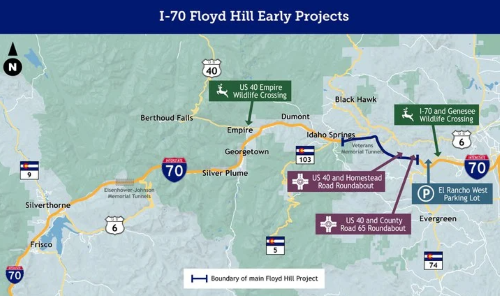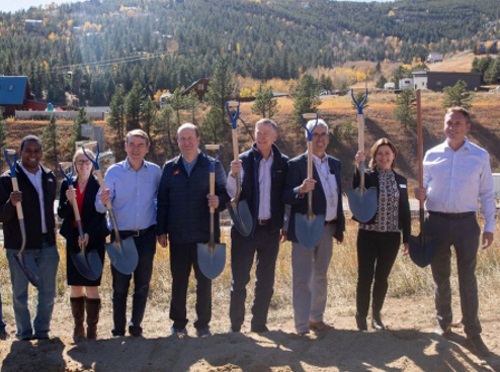Key initial components of the $700 million I-70 Floyd Hill project kicked off recently by the Colorado Department of Transportation include the construction of wildlife crossings and fences as well as a “mobility hub” to provide transit and electric vehicle services.
[Above photo by the Colorado DOT]
The project will rebuild a seven-mile stretch of I-70 from exit 248 northwest of Evergreen to exit 241 in eastern Idaho Springs and work to eliminate a bottleneck on one of the most congested stretches of the I-70 Mountain Corridor.
Early construction begins this fall with a new wildlife crossing at Genesee and roundabouts along US 40 between Evergreen and Floyd Hill, with major construction on the corridor starting in spring 2023.
“The I-70 Floyd Hill Project will improve travel time, reliability, and safety,” explained Shoshana Lew, executive director of the Colorado DOT, in a statement.

“By eliminating the bottleneck at Floyd Hill, the project will significantly ease congestion and decrease the number and severity of crashes through more consistent traffic flow and speeds,” she said. “The project will provide alternate emergency access through a newly connected frontage road system that strengthens safety and mobility for thousands of Coloradans that rely on I-70 to access their communities and for the millions who visit the mountains annually. Essential to this project are multi-modal options, including our Pegasus van service which already started last spring, and improvements to the Greenway trail for pedestrians and cyclists to enjoy Clear Creek County.”
Key wildlife and environmental improvements involved in the I-70 Floyd Hill project include:
- Improving the multimodal Greenway trail.
- Building wildlife crossings and fencing, and restoring nearby creek and riparian areas to protect and preserve the local environment and wildlife.
- Developing a mobility hub with electric vehicle infrastructure and accessibility options that integrate into the state’s I-70 transit service, including the new Pegasus van service added in May 2022 to the corridor.
- Providing permanent air quality monitors and coordinating rural broadband access with local communities.

